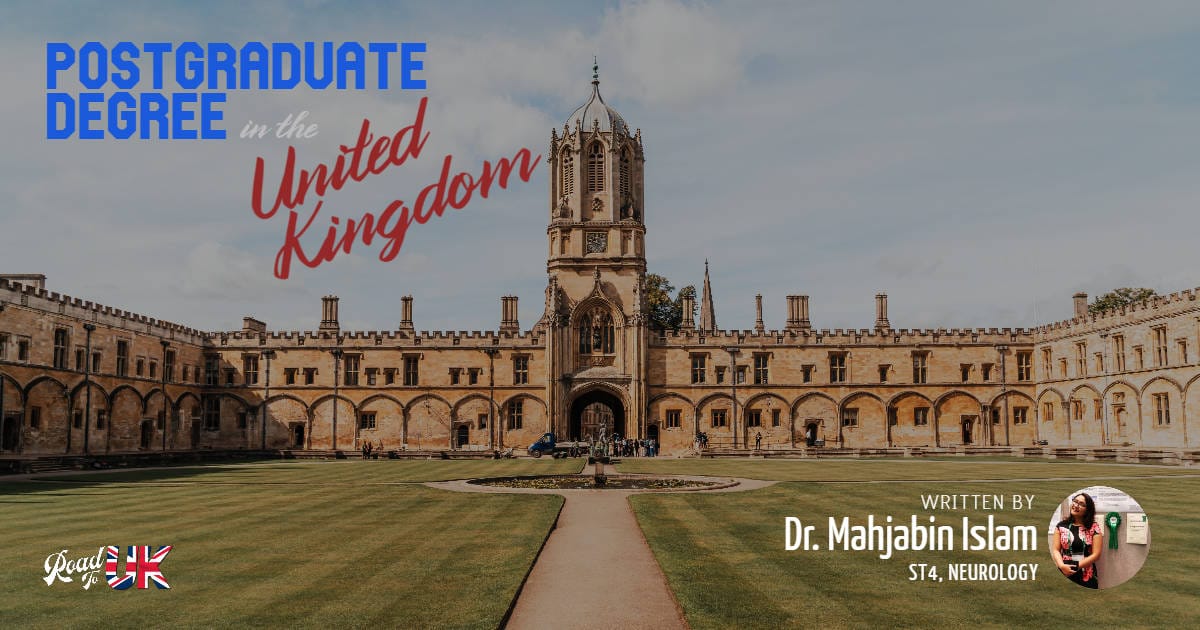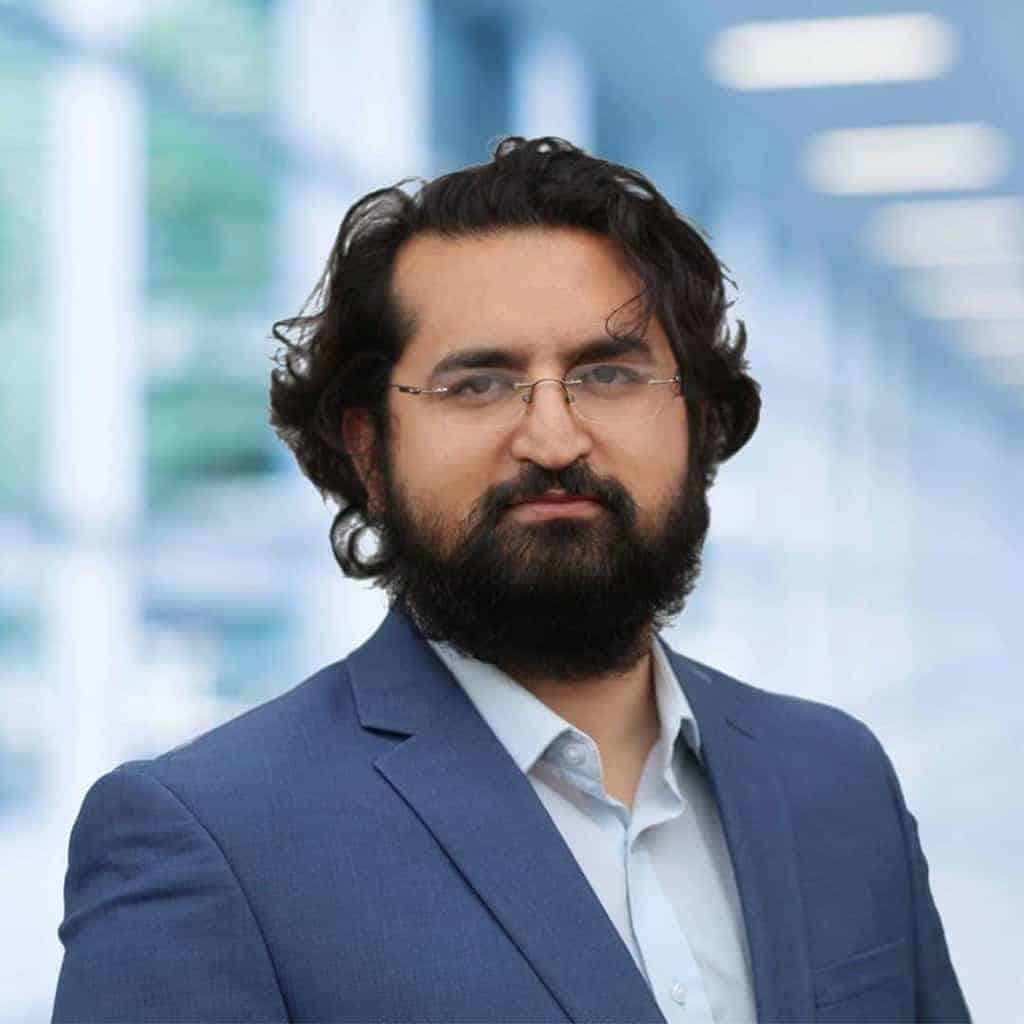Post Graduation Degree in the UK: MSc/PhD for IMGs

Hi lovely people, I, Dr. Mahjabin Islam, have managed some time to write about an important topic – academic post graduation degree in the UK – MSc/ PhD. We really need to have a clear idea why and when to do it and how it is different from clinical pathway. I am talking about clinical research (public health research is different from clinical research).
Master’s degree vs PLAB or MRCP?
To simplify the pathways – PLAB/ Memberships are needed for you to become clinicians, MSc and eventually PhDs will land you on an academic pathway. When you combine both, you become a clinical academic.
MSc/ PhD, in a simple term, are academic degrees. If you have a research interest and you want to learn from the basics, these are the qualifications for you. This will NOT lead onto clinical qualification unless you simultaneously do PLAB/ Memberships.

Why doing a master’s degree in the UK then?
If you are really interested in research, you want to learn more, you are able to generate new concepts – go for an MSc to start with. It is the stepping block. Depending on your projects, you may get further funding for PhD.
In the UK, you can get part funding from universities. You can also apply for external funding like Commonwealth/ Chevening.
Once you finish with MSc/ PhD and you want to get back to clinical pathway, do PLAB/ MRCP and start clinical training. Academic degrees give you an edge in clinical training applications, you score few extra points if you have publications.
You can eventually continue your clinical training exclusively or you can combine research with clinical training which is called Academic Clinical fellowships, where you get 25% research and 75% clinical training for 3 years.
The end point of combining clinical training with academia is to have both research and clinical expertise in the bag and eligibility to apply for university jobs for clinical lecturer/ senior lecturer which may eventually lead onto becoming professor of that specialty. Overall, it is not mandatory, but successful academia is prestigious.

What are the cons of postgraduate degree in the UK?
- Clinical Academic posts (Academic Clinical fellowships) are highly competitive.
- If you do not like research, it may feel like a drag for unnecessary reason.
- Grants/Funding are always a headache. Often, best researchers in the field get rejected for a funding.
- It will lengthen your overall training.
- Solely academic pathways after PhDs have fewer post doc jobs and even more competitive.
What academia is not?
This should never be regarded as easy access to the UK system. If you want to work in NHS as a doctor, the route is PLAB/ Membership.
If you do not like research (many many established NHS clinicians are not into research and this has never been a problem for them), do not jump into this pathway.
It is more important in the UK – what do you want to do? You can ace in clinical practice and can have managerial role/ teaching role/ governance role – you can opt for any of these instead of research.
Managing funding or scholarships for UK post graduation degree
We all can provide guidance, but you have to do the hard work. You have to find a professor, a university and your own funding.
Learn about deadlines of commonwealth/ Chevening/ Bill and Melinda gates funding. There might be a few others but do your own research, you may be surprised!
Write applications way ahead of deadlines. It requires time to have all papers ready for the application. Do plan early.

MBBS – How much does it effect?
If you have good results in MBBS with honours/ place, it gives you extra points. If you don’t, it does not matter. You need to prove you are promising enough for your university to fund you.
If you have a fail in MBBS, it does not shatter your possibilities. I know people who had to retake final prof exams, that did not hamper their commonwealth scholarships. They assess your academic potentials.
How to choose university for post graduation?
I know, we all aspire to be graduates from Oxford / Cambridge and they are indeed the top universities. Try for them and go with all guns blazing. But, not getting admission in these universitities should not stop you from anything.
Find a university which has the reputation for your subject. Find a professor who is world leader in your subject. End of the day, what you learn and what you are expert in, that only matters.

What will I do now? I passed MBBS and I am in a fix!
That was me! I did MBBS, had a BCS job (govt.) within 2 months of internship and I passed FCPS part 1 by then but I wanted to work in the UK as a doctor. Then, I said to myself, I cant do everything and its high time I should decide! I decided not to go for BCS and that was my informed choice which I felt was right for me.
In 2013, one wise friend advised me to go for commonwealth but I decided to go for MRCP as I wanted to make sure I complete a post-graduation degree early. I have been interested in research throughout but never had much of opportunity back home. And it does not matter! I am currently doing research within my clinical training and it is never late.
Wrapping Up
These are the following points I want you to understand:
- Choose what you want, not what you are told to.
- Understanding research is a good skill to have, especially when you have a formal degree.
- If you want to pursue only clinical career and want to work in NHS, work on PLAB/ Memberships.
- You have to do the hard work for your funding and admission. Use google, find universities, find experts in your field.
- Understand what your niche area of liking is. I found some YouTube channels are gold for understanding PhD.
- Clinical academia is hard but if you are passionate about both, by all means try it. You can complete PhD and then start clinical training or you can be within clinical training, come out of training for few years to do PhD and then complete training. It does not matter which one you do as long as you know what you do. If you want to be a clinical academic, you can still go ahead with further academic fellowships. All you need is passion and tenacity.
Long post, but wanted to clarify all the fogs about research and clinical training. Just want to conclude saying – Life is not a race! Enjoy what you do, success will find you! Good luck, hope it helps, happy to answer any question.
About the author

Dr. Mahjabin Islam currently works as a Neurology consultant in the NHS. Through her social media profile, she helps out many International Medical Graduates (IMGs) to work and get higher training in the UK.

